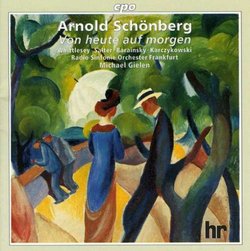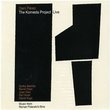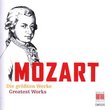| All Artists: Richard Salter, Arnold Schoenberg, Michael Gielen, Radio-Sinfonie-Orchester Frankfurt, Christine Whittlesey, Ryszard Karczykowski, Claudia Barainsky Title: Schoenberg - Von heute auf morgen / Wittlesey · Salter · Barainsky · Karczykowski · Gielen (1997 Straub & Huillet film) Members Wishing: 0 Total Copies: 0 Label: Cpo Records Release Date: 10/6/2000 Genres: Special Interest, Soundtracks, Classical Styles: Comedy & Spoken Word, Opera & Classical Vocal, Historical Periods, Modern, 20th, & 21st Century Number of Discs: 1 SwapaCD Credits: 1 UPC: 761203953226 |
Search - Richard Salter, Arnold Schoenberg, Michael Gielen :: Schoenberg - Von heute auf morgen / Wittlesey · Salter · Barainsky · Karczykowski · Gielen (1997 Straub & Huillet film)
CD DetailsSimilar CDs |
CD ReviewsA Twelve Tone Comedy....Odd! Christopher Forbes | Brooklyn,, NY | 12/30/2003 (4 out of 5 stars) "Poor Arnold Schoenberg. For better or worse, history has branded him as the "world's most difficult composer". It was never a label he took too all that well and many times in his life he tried to write "popular" music, only to have it collide with his unshakeable musical principals. This opera is a great example of why Schoenberg could never have written Cabaret.The genesis of Von Heute Auf Morgen is jealousy. Kurt Weill had scored a huge success with The Threepenny Opera and other composers had followed suite, also to good effect. So Schoenberg decided he too would write a "light domestic comedy" in hopes of courting the same sort of success that Weill had. His wife agreed to write the libretto. The story was a sort of mildly erotic domestic comedy of manners, though ultimately a convoluted one. To this rather lightweight frame Schoenberg attached some of his most uncompromising twelve-tone music of the 1920s. The result is a sort of nightmare comedy....the tone of the music works to cross purposes with the lightness of the libretto and the entire work feels disturbed and unsettled. It's as if a poor man's Noel Coward play were being viewed through a funhouse mirror. Needless to say, the work didn't catch on!Listening to this piece in the light of intervening years the score reveals much to admire. Schoenberg was past the initial more mechanical stage of twelve-tone writing, and was fully comfortable with the style, having written his first masterpiece of twelve-tone music, the Orchestral Variations. The composer's vocal writing is expert, managing to be expressionistic and lyrical by turns. Schoenberg always had an admirable sense of musical construction, creating superbly logical structures with dense counterpoint, but this is married to sensitivity to text, which is excellent. Unfortunately, the libretto and story of the work just don't match the inspiration of the composer. Had Schoenberg worked with a theatrical genius like Brecht, or like even Arthur Schnitzler, this might have been a truly effective work, at once comedic and horrific, though one despairs of it ever attaining the popular success of a work like Threepenny. However, as it is, the story is turgid, and the dramatic writing clumsy, so what would try for satire is merely ham fisted. And one wonders that Schoenberg actually thought that music like this could be popular. It just doesn't seem in the cards.This recording is one of the very few available. I'm not sure that I've even seen a recording of this work in the Boulez or Craft series, though such recordings must exist, since both men recorded the "complete" works of Schoenberg. To my mind, Gielen has authority in his Schoenberg interpretations. He is more in sympathy with the composer's expressionistic sound world, than the serialist Boulez or the somewhat objectivist Craft. To my mind, Schoenberg's works are far from exercises in formalism. They require a sensitivity to color and emotion that is almost romantic, something that neither Craft nor Boulez can do very well, wonderful as both men are in this repertoire. In this piece, Gielen conducts with a light touch and achieves an orchestral transparency that is admirable. He makes the best possible case I can imagine for this rather difficult work. The stars for this work are difficult to assign....this is not "must hear Schoenberg". If you only want one Schoenberg opera, you should make it Moses und Aron. And the composer's other operas, Erwartung and Die Gluckliche Hande should also be acquired before this work. The piece is ultimately a bit flawed. On it's merits alone I'd give the disc three stars....maybe three and a half. But the Gielen performance is so strong that I tip the balance in favor of four stars. If you want a recording of this out of the way work, you can't go with this disc." A Weimar Chamber-Opera... Sébastien Melmoth | Hôtel d'Alsace, PARIS | 01/30/2005 (5 out of 5 stars) ".
The genre of chamber-opera flourished in Germany of the Weimar Republic period. An handful of composers essayed the genre, and this is Schönberg's production. It's full of his tasty orchestrations, and it's light and satirical in the vein of Pierrot Lunaire--but constructed entirely in the 12-tone technique. Indespensible for a Schönberg fan, or a cultural historian of the Weimar Republic. . Schoenberg - Moses und Aron / Pittman-Jennings · Merritt · Boulez Schoenberg - Pierrot lunaire ~ Herzgewächse ~ Ode to Napoleon / Schäfer, Pittman-Jennings, Ensemble InterContempolain, Boulez ." |


 Track Listings (12) - Disc #1
Track Listings (12) - Disc #1

